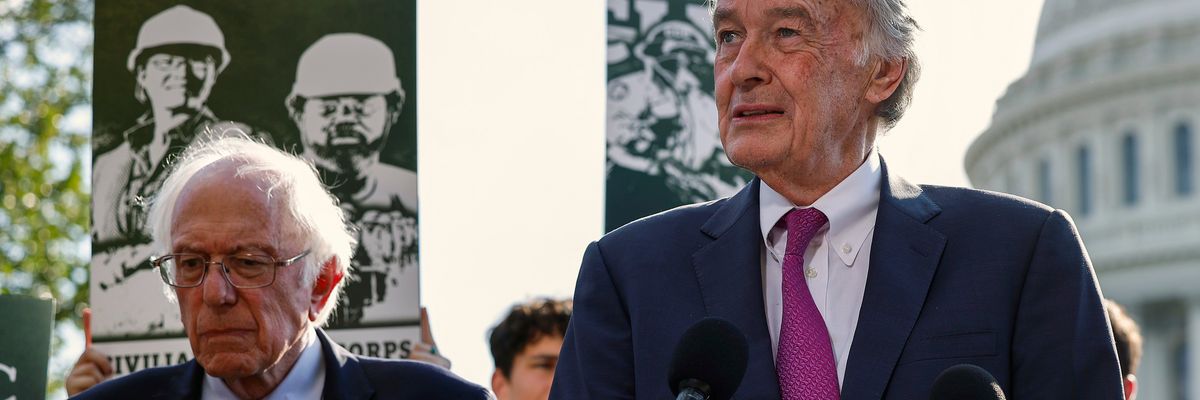Just U.S. Sens. Ed Markey and Bernie Sanders on Tuesday voted against legislation that one scientist warned this week "will only increase the danger to people already living downwind" of nuclear power facilities.
The Fire Grants and Safety Act—which now includes provisions from the Accelerating Deployment of Versatile, Advanced Nuclear for Clean Energy (ADVANCE) Act—passed 88-2, with six Republicans, three Democrats, and one Independent not voting.
Speaking on the upper chamber's floor Tuesday, Markey (D-Mass.)—who chairs the Senate Environment and Public Works Subcommittee on Clean Air, Climate, and Nuclear Safety—stressed his support for the United States Fire Administration and firefighter assistance grant programs, and those working to keep U.S. communities safe.
"Unfortunately, the vote today is not just for the lifesaving programs that I am staunchly on record as supporting," he explained. "On the coattails of this noncontroversial bill to protect our heroes, our colleagues in the House tacked on a dangerous additional 90-page package of provisions that merged the Senate's ADVANCE Act and the House's Atomic Energy Advancement Act."
The legislation—now on its way to President Joe Biden's desk—puts "corporate profits over community cleanup," the senator said. "Notably, the provisions from the Senate bill that would have provided a much-needed $225 million for communities affected by nuclear closures and $100 million to clean up contaminated tribal communities are not in the legislation anymore, as it came back from the House of Representatives—but the provisions to prop up the nuclear industry, they remain."
Highlighting that the bill would, among other things, require the Nuclear Regulatory Commission to rewrite its mission statement to say that its regulation and oversight should "not unnecessarily limit... civilian use of radioactive materials and deployment of nuclear energy," Markey declared that the NRC "shouldn't be the Nuclear Retail Commission."
"We have a duty to set the strongest possible standards for domestic and international nuclear activities, as an example to the rest of the world," he said of the United States. "We also have to clean up our existing messes, particularly in tribal and environmental justice communities, before investing in anything that might make those messes worse. As a result, despite my strong and continued support for the fire safety grants and my respect for my colleagues working on this issue, I must vote no."
"It's disappointing that the Senate chose to promote nuclear power when America is flush with energy options that are better for people and the planet."
Praising Markey and Sanders (I-Vt.), Beyond Nuclear on Wednesday urged the bill's critics to call their offices "to thank them for their courageous, wise, and good NO votes, despite it all," adding that "they spoke truth to power, and have kept some glimmer of hope alive, despite this very dark moment in the cause of anti-nuclear, environmental, and environmental justice activism."
The Senate's approval of the legislation was celebrated by the nuclear industry and its advocates. Environment America noted that in addition to the NRC mission statement rewrite, the bill "promotes nuclear power, including small modular reactors (SMRs) and highly concentrated nuclear fuel, and the export of nuclear materials and technology."
Johanna Neumann, senior director of the group's Campaign for 100% Renewable Energy, said after the vote, "It's disappointing that the Senate chose to promote nuclear power when America is flush with energy options that are better for people and the planet."
"Nuclear is, at best, a waste of resources. At worst, it's a meltdown," she continued. "Why are we choosing to split atoms when it's cheaper, faster, and better for the environment to cut energy waste and power our lives with wind and solar?"
"Government officials should embrace energy efficiency and renewables as the best solutions to America's challenges," she added.
Isaac Bowers, federal legislative director of Public Interest Research Group, similarly said that "American consumers have better energy options than nuclear power. It makes no sense to perpetuate this expensive, risky industry when America has an abundance of cleaner, safer, and more affordable renewable energy sources."
Critics also spoke out ahead of the vote. Union of Concerned Scientists director of nuclear power safety Edwin Lyman warned Monday that the aim of this bill is "weakening safety and security oversight across the board, a long-standing industry goal," and "a compromised NRC could lead to a catastrophic reactor meltdown impacting an entire region for a generation."
Food & Water Watch executive director Wenonah Hauter said last week that "every dollar wasted on unproven, enormously expensive nuclear energy schemes is a dollar not invested in truly clean, safe, and increasingly efficient wind and solar power. The Senate and President Biden must quickly come to their senses and reject the dangerous and unaffordable false promises of toxic nuclear energy."
While most senators made their positions on the bill clear on Tuesday, Beyond Nuclear is encouraging voters who still oppose the legislation "to express your displeasure and disagreement" to senators who supported it or didn't bother to vote.
Beyond Nuclear is also urging the bill's opponents to contact the White House, to pressure Biden to block it. "In the unlikely event" that he does so, the group acknowledged, "we would have a very tall mountain to climb to prevent Congress from overriding the presidential veto."
